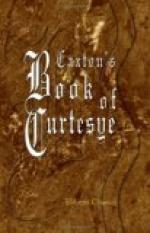P) And wha_n_ a-nother ma_n_ spekyth at the
table,
be ware ye int_er_rupte not
his langage,
for that ys a thyng on-comendable,
276
& yt ys not no signe of folk_is_
sage
To be of langage besy & owtrage;
ffor the wyse
sayd in his sentence
‘he shuld
be bold [& be wyse][1] that gevyth audyence.’
280
[Sidenote 1: In a later hand, above the line.]
[Sidenote: ffl C lxiij.]
P) Vnd_er_stond therfor or than ye speke;
prynt i_n_ yo_u_r mynde clerly
the sentence;
who that vsyth a ma_n_ys tale to
breke,
lettyth vncurteysly all[e]
the audyence 284
And hurteth hy_m_ self for
lake of scyence;
he maye not geve
answere co_n_venyente
that heryt[=h]
not fynally what ys mente.
CAXTON’S TEXT.
[39]
Lete not your spone / in your disshe sto_n_ding
[Sidenote: Don’t leave your spoon in your
dish or on the table.]
Ne vpon the table / it shold not lye
Lete your trenchour / be clene for ony thing
269
[Sidenote: Keep your trencher clean.]
And yf ye haue cha[=n]ge / yet as honestly
As ye can / make a voyde manerly
So that no fragme_n_t / fro your tre_n_cher falle
Do thus my childe / in chambre & in halle
273
[40]
[Sidenote: Leaf 7 b.]
And whan another man / spekith atte table
Beware ye enterrupte not / his langage
[Sidenote: Don’t interrupt man in his talk]
For that is a thinge discomendable
276
And_e_ it is no signe of folkes sage
To be of langage / besy and_e_ outrage
For the wyse man said_e_ / in his sentence
He shold_e_ be wyse / that gyueth audience
280
[41]
Vnderstonde therfore or than ye speke
Prynte in your mynde / clerly the sentence
[Sidenote: Before you speak, settle in your mind
what you have to say.]
Who that vsith / a mannes tale to breke
283
Letteth vncurteysly / alle the audyence
And_e_ hurteth hym self / for lack of science
He may not gyue answers conuenyente
That herith not fynally / what is mente
287
* * * * *
THE ORIEL TEXT.
[42]
Be ware Also, my childe, of rehersaille
Of materis whiche ben at the table mevide;
Hit grevith ofte and dothe men disavaylle,
290
Full many a man that vice hath mysschevide,
Of evill thyng saide is wors often contrivide;
Suche reportis alway loke
ye esschewe,
As may of olde frendis make
enemyes newe. 294
[43]




